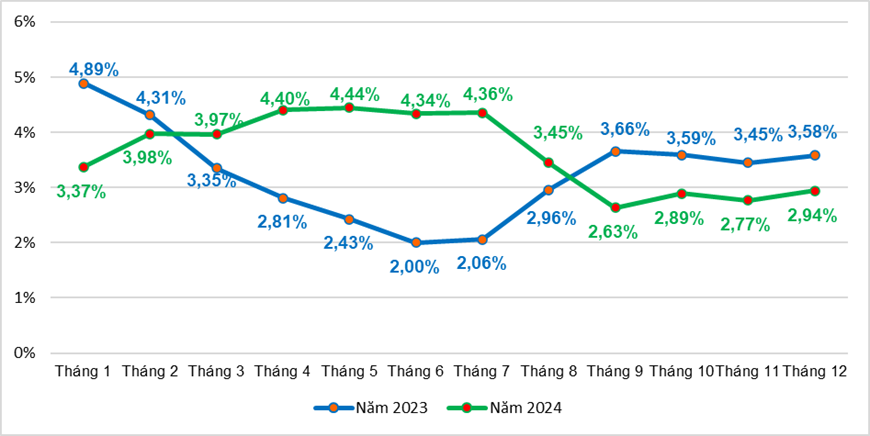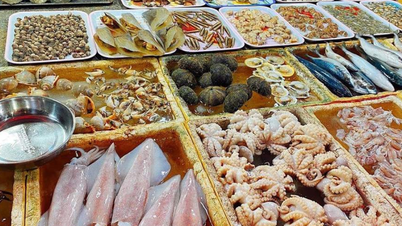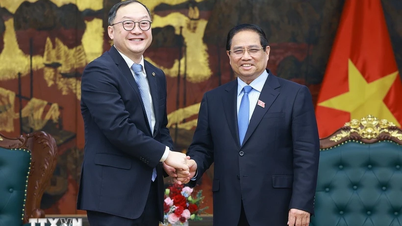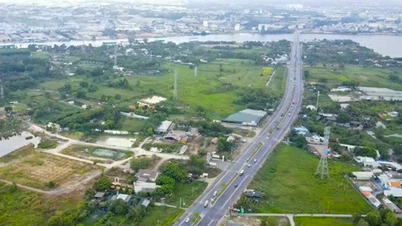According to economic experts, inflation in Vietnam in 2025 will be controlled at a reasonable level, fluctuating between 3.5-4.5%. Close monitoring and timely policy adjustments are necessary to ensure the target of controlling inflation in 2025.
Inflation in 2024 is under control
According to General Statistics Office ( Ministry of Planning and Investment ), in 2024, in the context of many complicated developments in the world, region and domestically, Vietnam's inflation will be controlled at an appropriate level.
Accordingly, military conflicts, geopolitical fluctuations, and instability continue to escalate in some countries; global economic and trade recovery is slow and unstable; aggregate demand and investment decline; Exchange rates and interest rates fluctuate unpredictably. Natural disasters, droughts, storms, floods, and climate change are becoming increasingly serious, severely impacting socio-economic development and people's lives. The trend of interest rate cuts by some major central banks in the world continues to expand as inflation is approaching the 2% target.

On December 12, 2024, the European Central Bank (ECB) reduced interest rates for the fourth time this year by 0.25 percentage points to 3%/year. On December 18, 2024, the US Federal Reserve (FED) also continued to cut interest rates by 0.25 percentage points to 4.25% - 4.5%/year.
In November 2024, US inflation increased by 2.7% year-on-year; in the eurozone it increased by 2.2%. Of which, Spain increased by 2.4%; Germany increased by 2.2%; France increased by 1.3%.
In Asia, India's inflation in November 2024 increased by 5.5%; Japan increased by 2.9%; Philippines increased by 2.5%; Indonesia increased by 1.6%; South Korea increased by 1.5%.
Vietnam's inflation is controlled at an appropriate level to support economic growth; CPI in December 2024 increased by 2.94% over the same period last year. The average consumer price index in 2024 increased by 3.63% compared to 2023.
Thus, inflation in 2024 in our country has been controlled, exceeding the target assigned by the National Assembly at the beginning of the year. This is an inflation rate that is consistent with the socio-economic situation in the country, actively supporting economic growth, contributing to macroeconomic stability, and is a bright spot in Vietnam's economic development results in 2024.

Inflationary pressure in 2025
Currently, according to economic experts, there are many factors that can create inflationary pressure in 2025. That is, military conflicts in some countries are escalating, unpredictable, and at risk of spreading. Trade competition between major countries is increasingly fierce. Along with that, extreme weather phenomena have a serious impact on the global economy and society. This can create disruptions in the supply chain, increase transportation costs, affect price fluctuations of strategic commodities in the world, and cause risks to energy security and food security.
In particular, the tax policies of US President-elect Donald Trump are likely to be very harsh, leading to retaliatory responses from countries. Increased trade protectionism and trade barriers will exacerbate trade tensions and disrupt global supply chains - which could trigger a new round of inflation, while slowing global economic growth and potentially causing unemployment to rise again.
Domestically, the cost of importing raw materials for production may increase according to world prices and be affected by exchange rate fluctuations, affecting costs and product prices, creating pressure on business production and thereby pushing up domestic consumer goods prices and creating pressure on inflation.
In addition, according to experts, continuing to implement the market roadmap for state-managed services such as electricity prices, tuition fees, and healthcare service prices in the direction of correctly and fully calculating all factors and costs will have an impact on increasing the consumer price index in 2025. Stimulus packages, lowering lending interest rates, expanding credit, and boosting public investment help to remove difficulties for the economy, but can also put pressure on price levels if money supply is not properly controlled.
In addition, as a rule, in the last months of the year and on holidays and Tet, prices of food, beverages, clothing, equipment and household items often increase. During the year, if natural disasters or epidemics occur, it will affect food prices in some localities - these will also increase the CPI...
According to Associate Professor, Dr. Ngo Tri Long, an economic expert, inflation in Vietnam in 2025 will be controlled at a reasonable level, fluctuating between 3.5-4.5%. This reflects the efforts of the Government and relevant agencies in maintaining macroeconomic stability and controlling prices. In particular, close monitoring and timely policy adjustments are necessary to ensure the target of controlling inflation in 2025.
Dr. Nguyen Ngoc Tuyen, former Director of the Institute of Economics and Finance (Academy of Finance) forecasts that the average CPI in 2025 compared to 2024 will increase by about 4%.
The main reason, according to Dr. Nguyen Ngoc Tuyen, is that the difficulties from geopolitical conflicts in the world may be less tense, which will create conditions for economic and trade development, and price fluctuations will be less negatively affected. Along with that, the economies of some countries recover, Vietnam's exports will have more difficulties, production and business costs will be large and the impact will increase prices.
In particular, the restructuring of the state administrative apparatus will increase state budget spending and impact consumer prices; many new infrastructure projects approved and started with huge investment capital will also be the cause of price increases...
Source: https://baolangson.vn/lam-phat-tai-viet-nam-nam-2025-nhieu-ap-luc-5035092.html



![[Photo] Prime Minister Pham Minh Chinh attends the groundbreaking ceremony of Trump International Hung Yen Project](https://vphoto.vietnam.vn/thumb/1200x675/vietnam/resource/IMAGE/2025/5/21/ca84b87a74da4cddb2992a86966284cf)
![[Photo] Prime Minister Pham Minh Chinh receives Rabbi Yoav Ben Tzur, Israeli Minister of Labor](https://vphoto.vietnam.vn/thumb/1200x675/vietnam/resource/IMAGE/2025/5/21/511bf6664512413ca5a275cbf3fb2f65)
![[Photo] Determining the pairs in the team semi-finals of the National Table Tennis Championship of Nhan Dan Newspaper](https://vphoto.vietnam.vn/thumb/1200x675/vietnam/resource/IMAGE/2025/5/21/eacbf7ae6a59497e9ae5da8e63d227bf)

![[Photo] Scientific workshop "Building a socialist model associated with socialist people in Hai Phong city in the period of 2025-2030 and the following years"](https://vphoto.vietnam.vn/thumb/1200x675/vietnam/resource/IMAGE/2025/5/21/5098e06c813243b1bf5670f9dc20ad0a)






























































































Comment (0)